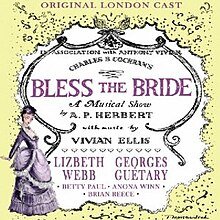1947: “Bless the Bride” – A Musical That Captured Post-War Optimism
In the aftermath of World War II, the world was slowly recovering from the devastating effects of the conflict. People were looking for moments of joy and escapism, and the entertainment industry responded with a variety of shows and performances. One such production that captured the essence of post-war optimism was the British musical “Bless the Bride,” which opened in London on April 26, 1947.
The musical, with music by Vivian Ellis and lyrics by A. P. Herbert, quickly gained popularity for its charming story and catchy tunes. One of the standout songs from the show was “This is My Lovely Day,” which became a favorite among audiences.
A Temporary Escape from Hardships
“Bless the Bride” provided a temporary escape for audiences who were still grappling with the hardships of the recent past. The show’s light-hearted storyline and uplifting music offered a much-needed respite from the realities of post-war life.
The musical tells the story of a young English girl, played by the talented leading lady, who finds herself unexpectedly engaged to a foreign prince. As the plot unfolds, the audience is taken on a journey filled with humor, romance, and a touch of intrigue. The show’s ability to transport viewers to a world of love and laughter made it a beloved production during its time.
Reflecting Theatrical Trends of the Era
“Bless the Bride” not only captured the post-war optimism of the time but also reflected the theatrical trends of the era. The show incorporated elements of traditional British musical theater while also embracing innovative ideas and styles. This combination appealed to a wide range of audience members, ensuring its success.
The musical’s creators, Vivian Ellis and A. P. Herbert, were able to strike a balance between nostalgia and modernity, resulting in a production that resonated with both older and younger generations. The show’s success can be attributed to its ability to appeal to different tastes while maintaining a cohesive and engaging narrative.
A Successful Run and Lasting Legacy
“Bless the Bride” enjoyed a successful run in London, captivating audiences for over a year. Its popularity led to various international productions, including a Broadway adaptation in 1948. The musical’s enduring appeal can be attributed to its timeless themes of love, hope, and the power of music to uplift the human spirit.
Over the years, “Bless the Bride” has become a beloved classic in the musical theater repertoire. Its catchy tunes and heartwarming story continue to resonate with audiences, reminding them of the enduring power of entertainment to bring joy and inspiration.
For those interested in delving deeper into the history of “Bless the Bride” and its impact on the entertainment industry, there are several external references available. These sources provide additional historical information, evidence, and insights into the production and its significance.
Overall, the opening of “Bless the Bride” in 1947 marked a significant moment in British musical theater history. It encapsulated the post-war optimism of the time and provided audiences with a much-needed escape from the hardships of the recent past. The musical’s success and lasting legacy are a testament to the power of storytelling, music, and the enduring human spirit.

